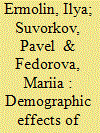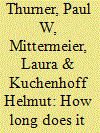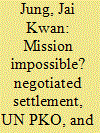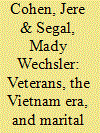| Srl | Item |
| 1 |
ID:
191082


|
|
|
|
|
| Summary/Abstract |
This article explores how the deportation of the Dargin people in the Caucasus affects intergenerational fertility rates and assesses the results of the experiment. The authors paid attention to two Dargin settlements located in the foothills and Mid-Mountains areas of Dagestan, the first of which was subject to forced replacement, but the other was left intact. Inhabitants of both settlements have close kinship ties and are tied by commodity trade as well. The authors obtained data through municipal registers and an additional survey conducted in the studied localities. We used event history analysis as the main methodology. The main findings cover the following: the foothill settlers managed to keep the social norms along with handicrafts that existed before deportation which brought about the intergenerational continuity in procreative behaviour and higher childbirth rates in the foothill settlement that have persisted for a long time.
|
|
|
|
|
|
|
|
|
|
|
|
|
|
|
|
| 2 |
ID:
119230


|
|
|
|
|
| Publication |
2013.
|
| Summary/Abstract |
How and why do some foreign policy crises end successfully and efficiently, but others do not? Do democracies deal better than non-democracies with foreign policy crises? Focusing on both the outcome and the duration of foreign policy crises, this article employs event history (survival) analysis to model and test three models of foreign policy crisis derived from realist, liberal, and constructivist theories and the level-of-analysis framework. The dataset in this article is drawn from the International Crisis Behavior Project, 1918-2007. The analysis indicates that democracies are more likely to solve a foreign policy crisis successfully and efficiently than non-democracies. While the involvement of international organization during a crisis has a negative effect on a state's goal of 'winning' a crisis more quickly, the increasing power of a rival also hinders and prolongs the achievement of success in a crisis. Finally, the more violence a state uses during a crisis, the more difficult it is for this state to solve the crisis in a timely manner.
|
|
|
|
|
|
|
|
|
|
|
|
|
|
|
|
| 3 |
ID:
132767


|
|
|
|
|
| Publication |
2014.
|
| Summary/Abstract |
Governments deciding to use nuclear energy as part of their country×s energy mix are faced with long-term planning efforts and huge investments. As nuclear power plants constitute one of the socially and politically most contested technologies, the question arises, which time horizons companies as well as politicians have to consider for the accomplishment and grid-connection of individual and whole fleets of reactors. Unfortunately, there are no large-N studies investigating the time for completion of such large-scale projects. For the first time, we statistically explain the duration of the construction of all initiated nuclear plant projects so far. Based on the International Atomic Energy×s comprehensive Power Reactor Information System (PRIS) we assess the impact of demographic, economic, and political preconditions of a country, at the same time accounting for different types of reactor technologies. To account for non-linear relationships, we apply non-parametric survival models with P-splines. A main result of our analysis is that time of connection to grid increases over the years indicating increased societal sensibilities, respect for higher security standards, and increased project complexities. The Harrisburg and the Chernobyl disaster did not induce a separate additional delaying effect.
|
|
|
|
|
|
|
|
|
|
|
|
|
|
|
|
| 4 |
ID:
151259


|
|
|
|
|
| Summary/Abstract |
Under what conditions can democracy emerge and survive in countries emerging from violent civil conflicts? Using event history analysis, this article shows that the chance for democratization increases substantially by the combination of two factors: whether a civil war ends through peace negotiations and whether United Nations (UN) peacekeeping forces are deployed after the signing of a peace treaty. Negotiated settlements or UN peacekeeping operations alone cannot resolve the security dilemma and credible commitment problems of civil war adversaries, which are the main obstacles to the transition from war to peace and democracy. Yet these factors have little to do with sustaining democracy in the aftermath of civil war. What matters most for the survival of democracy is rapid economic recovery that can provide better opportunities for former combatants to be reintegrated into normal economic life. These findings suggest that for successful post-conflict democratization the international community should mediate peace negotiations actively and also make a strong effort to maintain peace while helping to reconstruct the war-torn economy.
|
|
|
|
|
|
|
|
|
|
|
|
|
|
|
|
| 5 |
ID:
091690


|
|
|